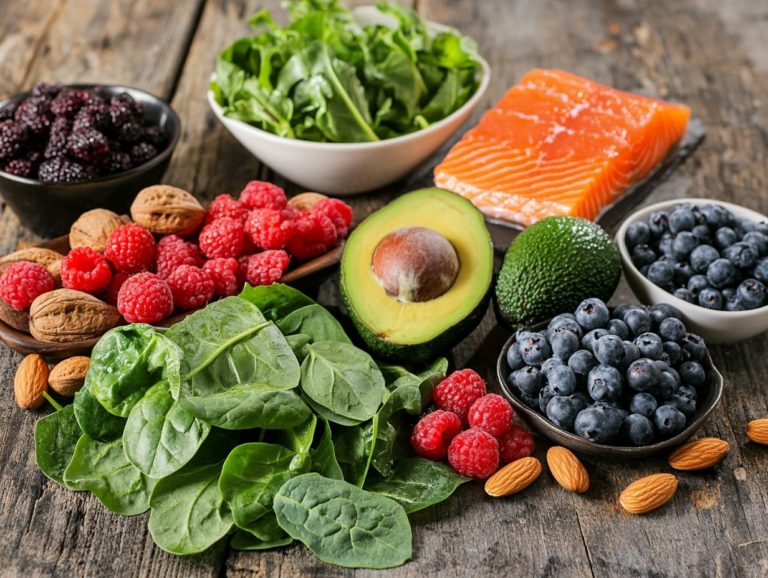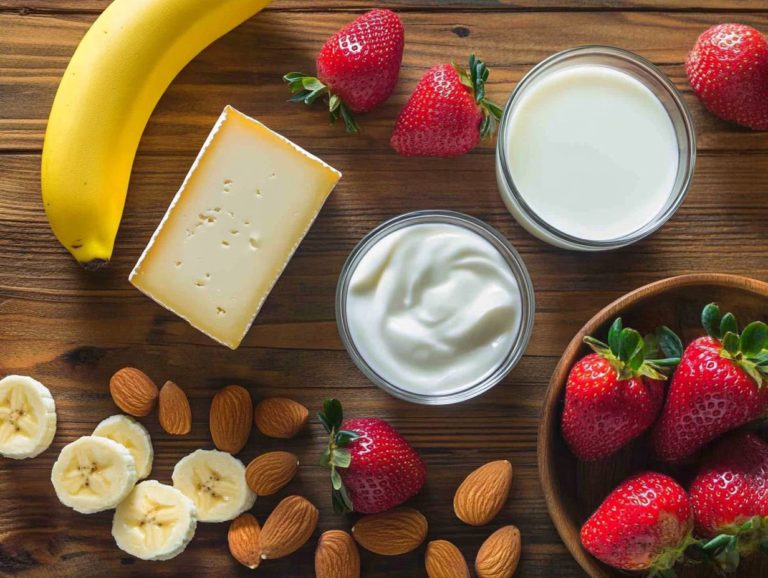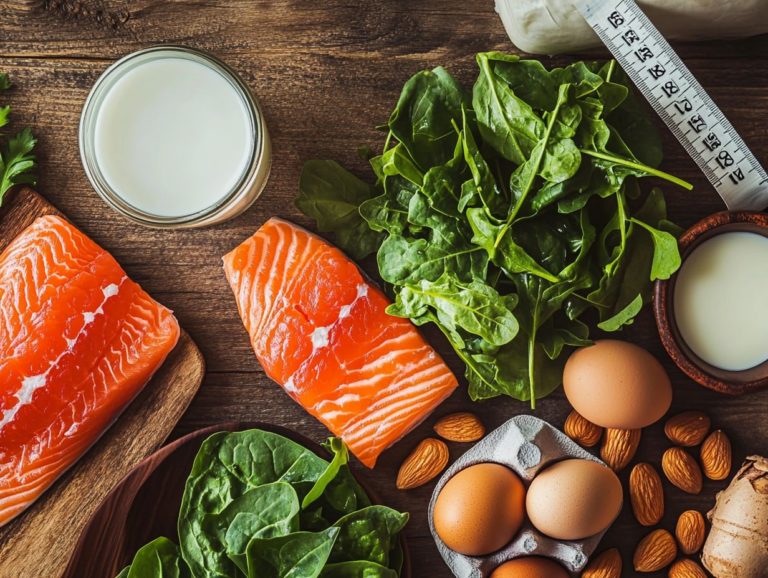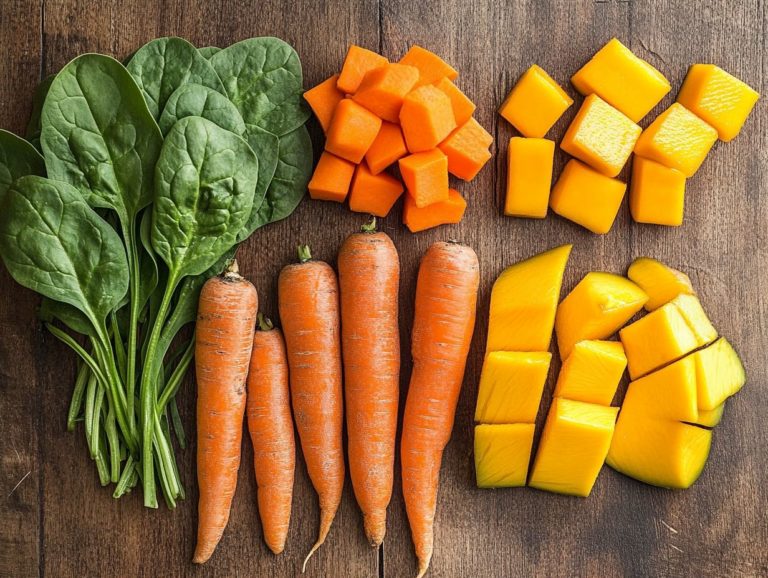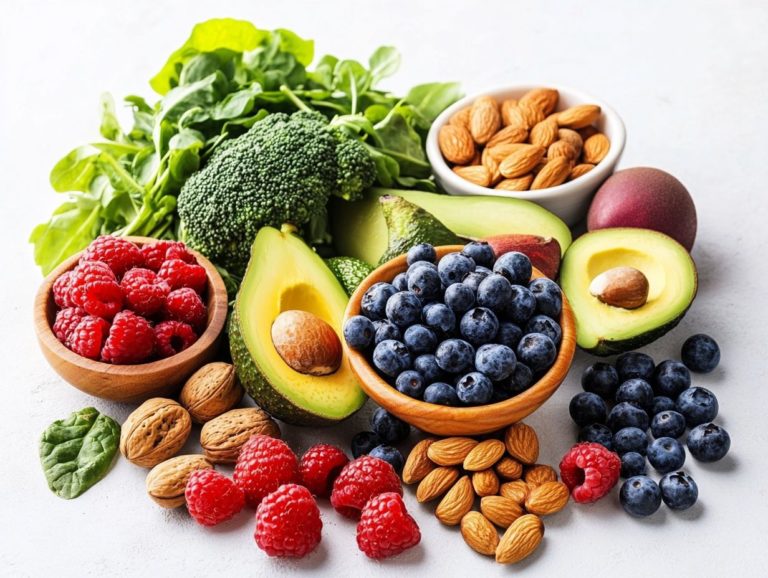The Importance of Food Sources for Weight Management
In your journey toward effective weight management, the role of food cannot be overstated. Grasping the balance between calories and essential nutrients is key for making informed dietary choices.
This guide will show you tasty foods that boost your weight goals! It delves into healthy food sources like fruits, vegetables, lean proteins, and whole grains that can help you reach your weight goals, while also highlighting unhealthy options to avoid.
You ll discover practical meal planning tips and the importance of regular exercise. Whether your aim is to lose weight, maintain a healthy lifestyle, or simply make better food choices, this guide will equip you to navigate your path to success.
Contents
- Key Takeaways:
- The Role of Food in Weight Management
- Healthy Food Sources for Weight Management
- Unhealthy Food Sources to Avoid
- Incorporating Healthy Food Sources into Your Diet
- The Importance of Regular Exercise
- Frequently Asked Questions
- What is the importance of food sources for weight management?
- What types of food sources are important for weight management?
- How do food sources affect weight loss?
- Can food sources impact our metabolism?
- What are some examples of good food sources for weight management?
- How can incorporating food sources into our diets be sustainable for weight management?
- Conclusion
Key Takeaways:
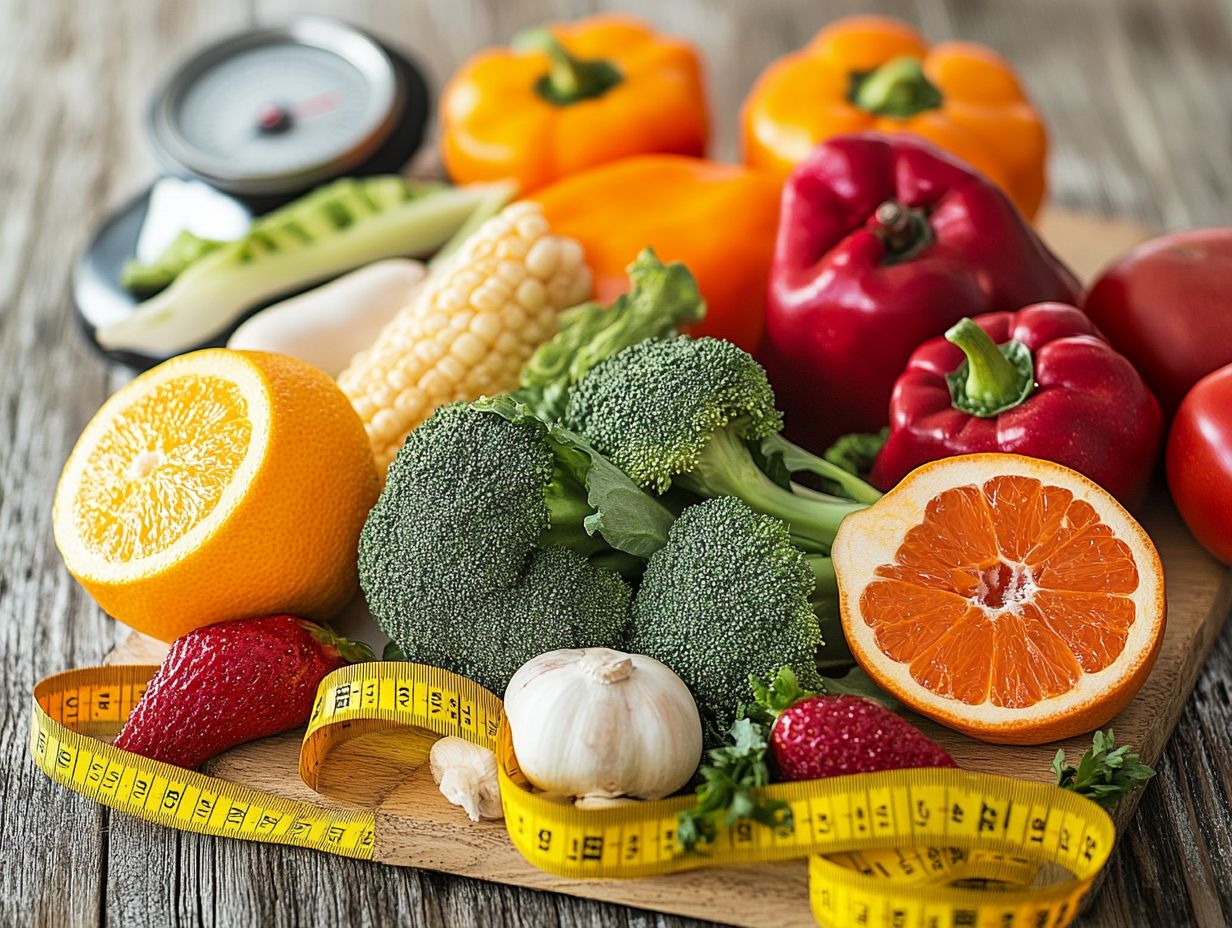
- Understanding the role of calories and nutrients is crucial for effective weight management.
- Incorporating fruits, vegetables, lean proteins, and whole grains can support a healthy weight.
- Avoiding unhealthy options like processed foods and sugary drinks is vital for maintaining a balanced diet.
The Role of Food in Weight Management
Food is essential for maintaining a healthy weight and managing your overall health. By selecting nutritious options, like whole grains, lean proteins, and fresh produce, you can significantly enhance your journey toward achieving and sustaining your weight goals.
A balanced diet not only satisfies your caloric needs but also delivers the essential nutrients necessary for your body to function optimally. These nutrients support a vibrant lifestyle.
Your food choices directly influence your ability to maintain a healthy weight and manage energy levels. They also help you stick to effective dietary strategies tailored to your activity levels and medical conditions.
Understanding Calories and Nutrients
Understanding calories and nutrients is essential for crafting a balanced diet aligned with your weight management goals. There are three main types of nutrients: carbohydrates, proteins, and fats, each playing a vital role in your overall health.
Carbohydrates deliver 4 calories per gram and are primarily responsible for fueling your energy levels, especially during physical activity. Proteins also provide 4 calories per gram and are crucial for muscle repair and growth, especially for those who exercise regularly.
Fats pack 9 calories per gram and are key for hormone regulation and nutrient absorption. To achieve a well-rounded diet, assess your caloric needs based on your activity levels and adjust the proportions of these nutrients accordingly.
This way, you ensure you re getting the right mix to support your unique lifestyle and health objectives.
Healthy Food Sources for Weight Management
Incorporating healthy food sources into your diet is crucial for effective weight management. These options provide the essential nutrients your body needs without piling on excessive calories, making it easier to maintain a healthy weight.
Fruits and Vegetables
Fruits and vegetables are essential pillars of a balanced diet. They offer an abundance of fiber and vital nutrients while remaining low in empty calories.
By including a variety of these vibrant foods, you can significantly boost your fullness and enhance your weight management efforts.
For example, apples and pears are high in fiber, which slows digestion and helps you feel full for longer.
Leafy greens like kale and spinach are not only high in fiber; they re also packed with vitamins, minerals, and antioxidants that support your overall health.
Legumes, such as lentils and chickpeas, provide a generous dose of protein along with fiber, making them excellent choices for staying satisfied while managing your weight.
Start incorporating these healthy foods today for a better you!
Lean Proteins
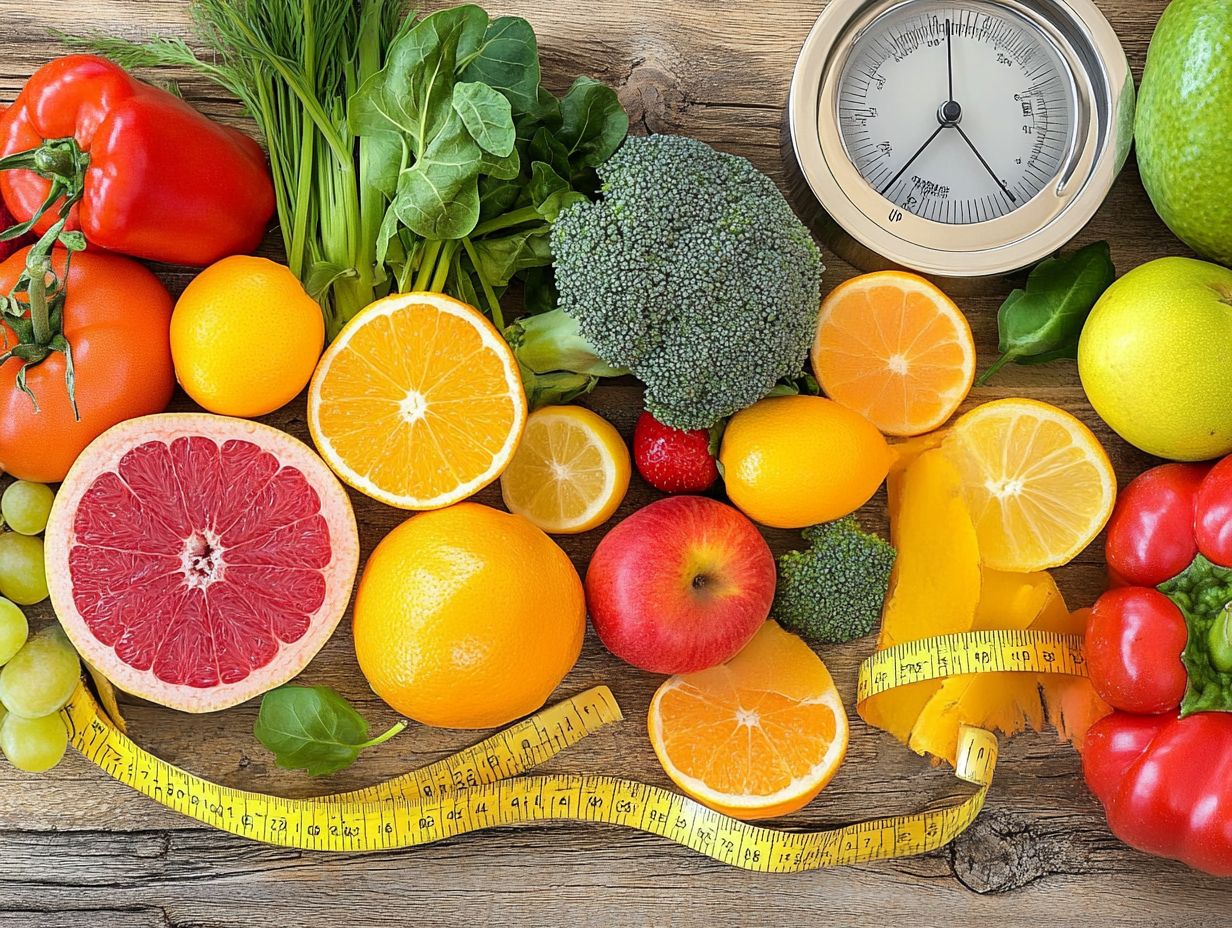
Incorporating lean proteins into your diet is essential for supporting muscle health and boosting your metabolic rate. Ultimately, it aids in effective weight management.
These proteins come from a variety of sources such as poultry, fish, legumes, and low-fat dairy. Each offers unique advantages that can help you achieve your weight loss goals.
By prioritizing lean options, you can savor hearty meals without the extra calories and saturated fats typically found in red meats. Integrating these proteins into your daily meal plans helps you meet dietary guidelines and promotes a sense of fullness.
The essential amino acids in these sources are crucial for muscle repair and growth. This enhances your body s ability to burn calories efficiently.
Whole Grains
Whole grains are an essential cornerstone of a balanced diet. They provide vital fiber and nutrients that promote digestion and overall wellness.
These grains include brown rice, quinoa, barley, and whole wheat. Each brings a unique array of vitamins and minerals that refined grains cannot match due to processing.
Unlike refined grains, whole grains retain the bran, germ, and endosperm. This ensures that all those nutritious components stay intact.
Incorporating whole grains into your meals elevates flavor and texture. It aligns seamlessly with dietary guidelines advocating for whole foods to achieve optimal health.
By embracing whole grains, you can enhance your energy levels and support heart health. They are a superb choice for meal planning and daily nutrition.
Unhealthy Food Sources to Avoid
Avoiding unhealthy food sources is essential for maintaining your weight and overall health. These choices often contain added sugars, excessive sodium, and unhealthy fats.
Prioritizing nutritious options gives you the power to stay on track and cultivate a healthier lifestyle.
Processed Foods
Processed foods often come loaded with empty calories, added sugars, and unhealthy fats. This can undermine your weight management efforts and overall health.
These foods frequently skimp on essential nutrients, leaving you hungry for nourishment even after consuming large amounts. This lack of feeling full can lead to overeating.
Relying too much on processed foods can disrupt your metabolic processes. It can also pave the way for long-term health issues.
By prioritizing more nutritious choices, you can elevate your dietary quality. This supports your well-being and strikes a better balance in your nutrition.
Sugary Drinks
Sugary drinks are a major source of added sugars and empty calories. They play a significant role in weight gain and various health issues.
These beverages typically provide little to no nutritional benefits. They become a key player in excessive caloric intake.
As you indulge in these sweetened drinks regularly, you may find it increasingly difficult to manage your weight effectively. Your daily calorie consumption can swiftly surpass recommended levels.
To counter this trend, consider embracing alternative beverages such as:
- Water
- Herbal teas
- Sparkling water with a splash of fruit juice
These options can curb your cravings without the additional sugar. By adopting strategies like reading ingredient labels and planning your meals, you can support a healthier lifestyle.
Incorporating Healthy Food Sources into Your Diet

Incorporating healthy food sources into your diet demands a thoughtful approach to meal planning and portion control.
By doing so, you ensure that your food choices harmonize with your weight management goals and meet your nutritional needs seamlessly.
Tips for Meal Planning and Portion Control
Effective meal planning and portion control are key strategies for achieving and maintaining a healthy weight through mindful food choices.
To successfully implement these techniques, you can start by analyzing food labels to grasp the nutritional content and serving sizes. This understanding gives you the power to make informed decisions.
With this insight, you can balance your food groups, crafting a vibrant plate filled with colorful fruits, vegetables, proteins, and whole grains.
It’s vital to assess your personal caloric needs, as they vary based on your activity levels and age. By creating a structured plan that incorporates these elements, you ll find that meal preparation becomes not only more efficient but also enjoyable and perfectly aligned with your health goals.
The Importance of Regular Exercise
Regular exercise serves as an essential part of your pursuit of achieving and maintaining a healthy weight. It beautifully complements your dietary strategies by boosting caloric expenditure and enhancing your overall well-being.
How Exercise Supports Weight Management
Exercise plays a crucial role in supporting your weight management goals by increasing caloric needs, promoting a healthy weight, and enhancing your overall fitness levels.
This multifaceted approach not only burns calories during your workouts but also elevates the rate at which your body uses energy while at rest, ensuring that your body continues to utilize energy efficiently.
Different types of activities be it aerobic exercises like running or cycling, strength training with weights, or flexibility exercises such as yoga contribute uniquely to weight loss and maintenance.
By tailoring these activities to match your individual fitness levels, you can engage in them without feeling overwhelmed, significantly boosting the likelihood of sticking with your routine.
This personalization allows you to adapt your workouts to your lifestyle preferences and physical capabilities, removing barriers to entry and fostering a sustained commitment to your health.
Frequently Asked Questions
What is the importance of food sources for weight management?
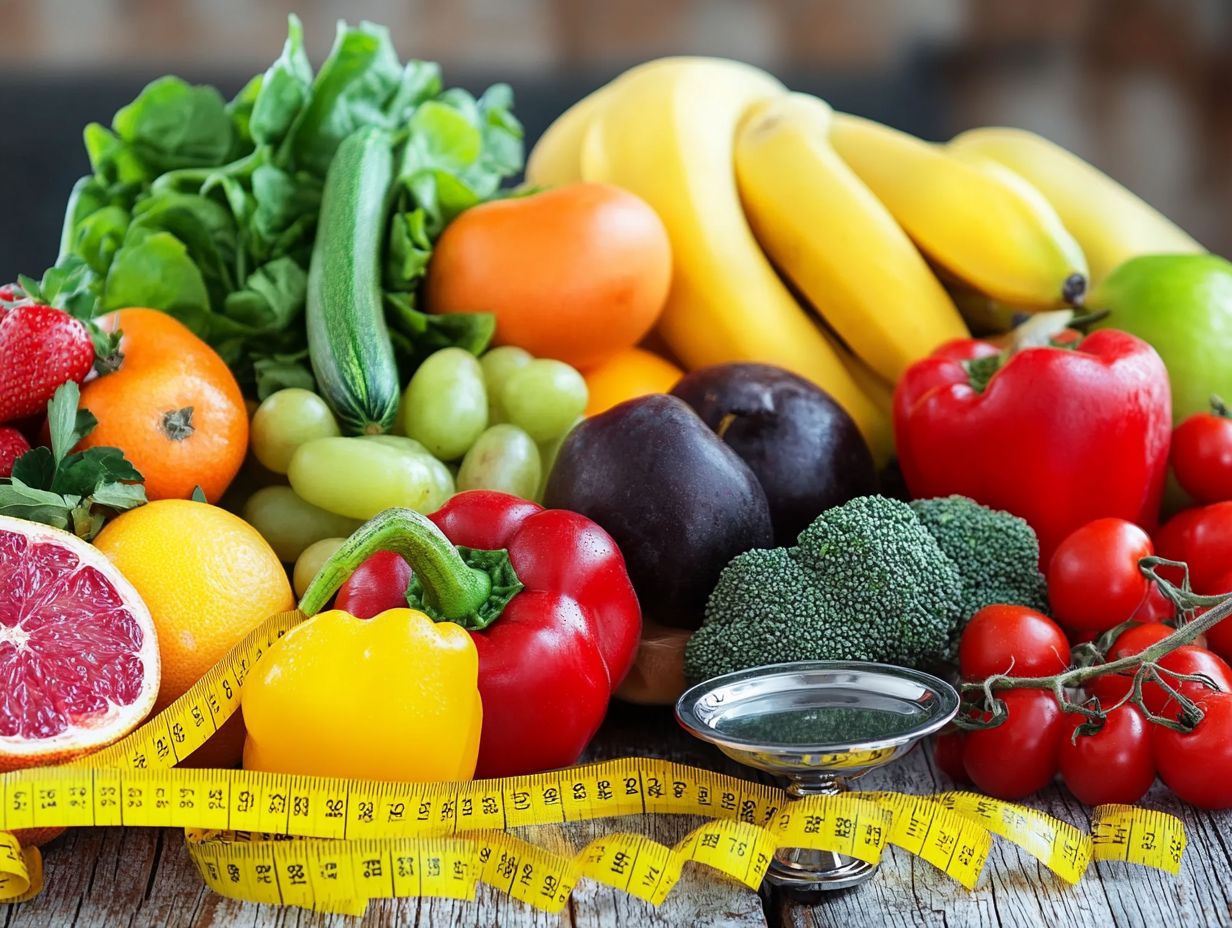
Eating a balanced and nutritious diet is essential for maintaining a healthy weight. Different food sources provide our bodies with the necessary nutrients to support weight management and overall health.
What types of food sources are important for weight management?
A combination of whole grains, lean proteins, fruits, vegetables, and healthy fats is crucial for weight management. These food sources provide essential vitamins, minerals, and macronutrients that aid in weight loss or maintenance.
How do food sources affect weight loss?
The type and amount of food we consume have a significant impact on our weight. Eating nutrient-dense foods that are low in calories can aid in weight loss, while consuming highly processed and calorie-dense foods can lead to weight gain.
Can food sources impact our metabolism?
Yes, certain food sources, such as protein-rich foods, can increase our metabolism and help burn more calories. Eating a balanced diet with a variety of food sources can also prevent a slow metabolism, which can contribute to weight gain.
What are some examples of good food sources for weight management?
- Whole grains like quinoa and brown rice
- Lean proteins like chicken and fish
- Fruits and vegetables
- Healthy fats like avocados and nuts
How can incorporating food sources into our diets be sustainable for weight management?
Incorporating a variety of food sources into our diets can provide us with a sustainable approach to weight management. Consuming a well-rounded and balanced diet can prevent cravings and overeating, making it easier to maintain a healthy weight in the long run.
Conclusion
Start planning your meals today and discover the joy of incorporating diverse food sources into your diet. Remember, every small step you take towards healthier choices counts! Try to include colorful fruits and veggies on your plate for a nutritious boost!

